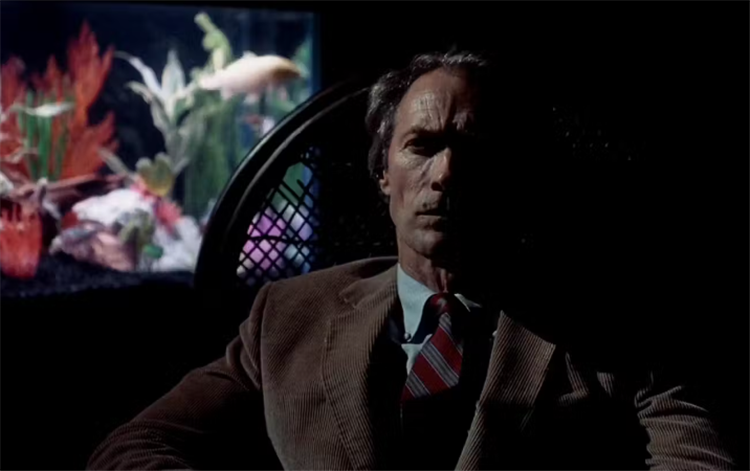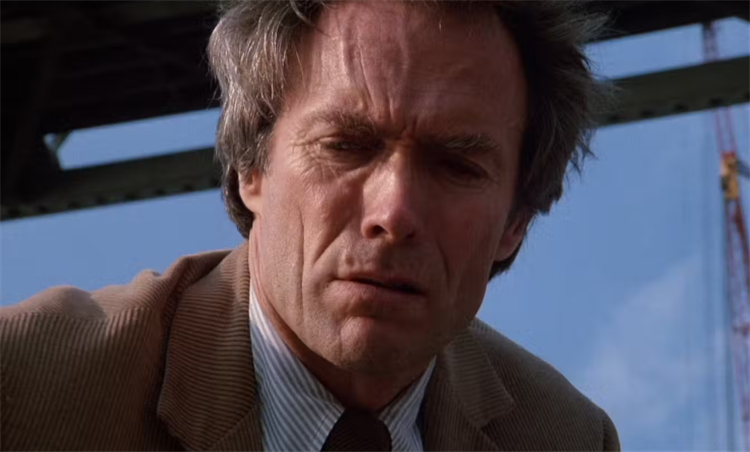Ever since Clint Eastwood gained major film stardom with the Dollars Trilogy film series, the director/actor has consistently shown a willingness to experiment with his archetypal screen image within genre conventions. While most stars become more risk-averse over time, over fear of losing their popular standing, Eastwood has never stopped taking risks.
His adventurous spirit as a director and star has never been presented as interestingly as it is in the grimy 1984 thriller film Tightrope, in which Eastwood subverts audience expectations by playing an ostensibly standard hero cop character who also happens to be a creep. Indeed, while Tightrope contains all the requisite elements of the standard cop thriller formula, in which his character doggedly collects evidence and witness statements in the course of attempting to catch a killer, Tightrope also presents Eastwood as a deeply flawed single father whose unhealthy sexual behavior threatens to destroy Block’s life.
While Tightrope functions effectively as a tense thriller, in which Eastwood, the film’s uncredited director, employs various slasher film conventions for shocking effect, the film primarily revolves around whether his character can reconcile his complicated feelings toward women. By taking this unconventional approach with Eastwood’s character, Tightrope illustrates why the actor has consistently been the most ambitious and interesting box-office superstar of his generation.
Tightrope Is Arguably Clint Eastwood’s Darkest Film

In Tightrope, Clint Eastwood plays Wes Block, a New Orleans homicide detective who is far removed from his iconic Dirty Harry Callahan character, specifically in terms of his deviant sexual behavior, in which he likes to have sex with women who are bound, preferably handcuffed. Block’s superiors are seemingly unaware of his white-knuckle sexual addition when he is assigned to investigate the murder of a young woman who worked as a prostitute in the notorious French Quarter neighborhood, where more women are subsequently murdered in grisly fashion.
Block’s investigation is complicated by his decadent sexual desires. He struggles with how to enter the world of prostitution as a cop after having previously been a regular customer. As the body count increases, he struggles to contain his sexual urges, which are exacerbated by his previous sexual involvement with several of the killer’s victims. Like a vampire, Block lives in figurative and literal darkness. During a scene in which one of his daughters questions why he has to continually go out at night, Block explains that his job requires this, as most of the victims and witnesses he encounters in his grim job aren’t visible in daylight.
However, once he leaves his daughters in the custody of a babysitter and sets out into the dreary New Orleans night in the guise of an investigating cop, his sexual obsessions are unleashed. After the first prostitute is murdered in the film, Block visits the prostitute’s brothel, where a prostitute seduces him after being questioned by Block. Unbeknownst to him, the killer is watching his every move. At this point in Tightrope, Block’s hunter starts to become the hunted.
Eastwood’s Wes Block Has a Jekyll-and-Hyde Inner Conflict
The script for Tightrope was written by Richard Tuggle, who previously collaborated with Clint Eastwood on the 1979 prison film Escape from Alcatraz. While Tuggle is credited as the director of Tightrope, he was allegedly replaced early in the production by Eastwood, who nonetheless refused to accept directorial credit for his work on the film.
The original screenplay of Tightrope raises the intriguing possibility that Eastwood’s character is a suspect in the prostitute murders that take place in the film. While this concept was eliminated early in the production process, Block’s prior sexual relationships with the victims nonetheless serve to establish the duality of his twisted nature, in which he, by entering the New Orleans underworld to find the killer, runs the risk of becoming virtually identical to the human slime he finds there.
Tightrope Explores Themes of Fatherhood and Fear

The sleazy aspects of Tightrope are contrasted by the loving relationship that exists in the film between Clint Eastwood’s Wes Block and his daughters, whom he describes as being the only part of his life that he hasn’t screwed up. The palpable sense of tenderness and trust between Block and his daughters is highlighted in a scene in which his oldest daughter, Amanda, played by Eastwood’s daughter, Alison, gently drapes her arms around Block, who’s fallen into a drunken sleep and falls asleep beside her father.
Block’s warm interactions with his daughters, in contrast to his sordid sexual encounters in the French Quarter, establish that his unhealthy feelings toward women don’t reflect a hatred of women but rather a fear of them. This is highlighted by the relationship that forms between Block and Beryl Thibodeaux, a rape prevention expert whom he consults in his pursuit of the killer. Through his relationship with Beryl, played by Genevieve Bujold, he sees a chance for his first normal relationship with a woman since his divorce and a reprieve from the meaningless sexual encounters that had previously dominated his nighttime existence. However, Block finds it difficult to share intimacy with Beryl, whom he has a nightmarish vision of strangling.
The breakthrough in this relationship and Block’s overall psychological entanglement occurs in a scene in which Beryl takes his police handcuffs and then proceeds to handcuff herself in front of him, who recoils as she reaches out to touch his face. When Block removes the handcuffs after allowing this woman to discover his dark secret, he also removes his fear. Tightrope is available to rent on Prime Video.
